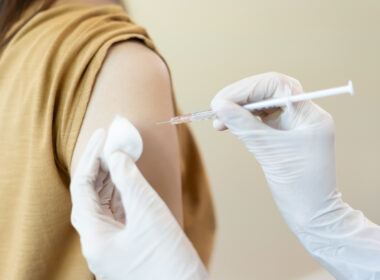In a recent People magazine story, Naomi Watts shared her story of unexpectedly entering perimenopause (literally meaning “around menopause,” described more here) while still in her thirties. The British actress said:
“I found myself at 36 and perimenopausal, a word I didn’t even know about, and at the precipice of trying to start a family. So I went into complete panic, felt very lonely, very much less-than or like some kind of failure and what was I going to do? There was no one to talk to, there was no information…”
What options was Watts given to manage her “massive” night sweats and hot flashes? She recalls only being offered hormonal birth control: “Here’s a patch or a gel or a spray.”
Watts’ doctor’s words echoed the American College of Obstetricians and Gynecologists (ACOG)’s position that hormonal contraception, be it combined estrogen-progestin or progestin-only medication, is both effective for pregnancy prevention and as a safe, first-line treatment for perimenopausal symptoms like irregular cycles, hot flashes, or night sweats. While it is true that hormonal contraception may act as effective pregnancy prevention and minimize some problematic perimenopausal symptoms, citing those two effects alone doesn’t tell the full story of hormonal birth control’s impact on the female body. Today, we’re going to offer a different perspective, one that focuses on why you should avoid hormonal contraception during the perimenopausal years.
There are at least three good reasons to ditch or avoid beginning hormonal contraception during perimenopause. They are: 1) You may miss your transition to menopause (and there’s good reason to be in-the-know about this!) 2) Your postmenopausal health could depend on the health of your hormones during perimenopause, and 3) Hormonal contraception can exacerbate perimenopause symptoms like vaginal dryness during sex, insulin resistance, and mood swings. Let’s unpack each of these three reasons.
1) You may miss your transition to menopause, and there’s good reason to be in-the-know about this!
Things change for women hormonally around their late 30’s and early 40’s. Periods may become a bit more erratic or suddenly painful. Initially, more eggs are “recruited” to mature each cycle (in a last ditch attempt to use them all!), which results in significant fluctuations in estrogen levels (sometimes much higher than your previous normal high, sometimes lower than your previous normal low) and irregular ovulation. Irregular menstruation and faltering progesterone levels often follow. According to the Mayo Clinic, “If you have a persistent change of seven days or more in the length of your menstrual cycle, you may be in early perimenopause. If you have a space of 60 days or more between periods, you’re likely in late perimenopause.”
Women may experience sudden insomnia, decreased libido, changes with metabolism, night sweats, vaginal dryness, bladder issues, and/or increased fatigue. University of British Columbia endocrinology professor Dr. Jerilynn Prior calls it “Estrogen’s Storm Season”.
While the word perimenopause sounds like a grim fate, it’s a perfectly normal deregulation of hormones that can take place over a decade or longer prior to actual menopause. It’s tempting to turn to the Pill to deal with these often annoying, sometimes debilitating symptoms. But what if there was a better way? What if there was a way to tackle this transition that could help ensure better postmenopausal health?
2) Your postmenopausal health could depend on the health of your hormones during perimenopause
Hormonal health is continuous and connected. You cannot isolate a hormonal event in a woman’s life from other hormonal events. Puberty, pregnancy, breastfeeding, perimenopause, and, yes, menopause are all intertwined. How breasts develop during puberty can affect breastfeeding years down the road. Pregnancy hormones affect postpartum hormones. Ovulation health in the critical years before a woman’s mid-twenties directly impacts bone mass, which is largely fixed until menopause. So yes, what happens during perimenopause affects overall health and well-being during the postmenopausal years.
If you are on hormonal contraception during perimenopause, you may not be experiencing the irregular or sometimes heavy periods that typically accompany this phase of fertility (and, no, the Pill is not “regulating your cycle,” because the bleeding episode you have while on it is not a true period), but then you’ll have no visible or physical gauge of what your hormonal balance (or lack thereof) is. Use of the Pill also precludes receiving the benefits of ovulation for bone, brain, breast, heart, immune health.
3) Hormonal contraception can exacerbate perimenopause symptoms including dryness during sex, insulin resistance, and mood swings, and it adds its own risks for new problems
Vaginal dryness
Hormonal contraception can also exacerbate some symptoms during perimenopause, particularly dryness during sex, insulin resistance, and mood regulation. Hormonal contraception is a main culprit when it comes to vaginal dryness because it deprives women of exposure to endogenous estrogen (i.e. estrogen that the body makes itself), which is a crucial source of natural lubrication. (The cervical crypts have the ultra important job of making the almighty cervical fluid!) When there is no exposure to endogenous hormones, as is the case on hormonal contraception, the cervical crypts lose the ability to produce cervical fluid in such abundance. Of course, some dryness in perimenopause is natural as a result of diminishing hormone levels. But hormonal contraception can make this dryness even worse.
Insulin resistance
Many women also find as they enter this chapter that their diets have to shift a little. They can’t down 2 beers and a pizza the way they could in their 20’s! Increasing insulin resistance as people age is one reason for the increased difficulty losing weight and (unfortunately!) increased ease in gaining weight.
What exactly is insulin? Insulin is produced in the pancreas, and it tells glucose (think the fuel you get from the food you eat) what to do and where to go (into the cells or into the bloodstream, for energy now or into storage as either glycogen or fat for later). There is strong evidence that estrogen plays an important role in optimizing insulin function [1]. If you’re on hormonal contraception, you miss out on the benefit of your body’s estrogen helping regulate your insulin. Not to mention the fact that hormonal contraception has been linked to nutrient depletion, and perimenopause is a time where women need all the nutrients they can get.
Mood swings
Lastly, mood swings can occur as the ovaries start to downregulate in the years prior to menopause. Any transitional season comes with a little erraticism and perimenopause is no exception. Hormonal contraception, a known mood disruptor, can make this even worse [2]. A better approach would be to tackle these symptoms head on with diet, exercise, and in some cases, bioidentical progesterone therapy.
Ideally, of course, 30-40 years ahead of time, we would have been prioritizing healthy hormones (and therefore balanced endogenous hormones) during puberty, throughout our 20’s and 30’s, and during pregnancies and postpartum–all of which would make for the best insurance of healthy hormones throughout perimenopause and postmenopause. Sadly, many women never learn (or learn too late) that none of this can be achieved on the Pill, because endogenous hormone production is shut down by hormonal contraception.
New problems
Hormonal birth control doesn’t just have the potential to make perimenopause symptoms worse, it can cause entirely new problems. These new problems include increased risk for breast cancer, cervical cancer, gallbladder disease, blood clots, heart attack, and stroke, among others. Women struggling with pesky perimenopausal symptoms deserve options that alleviate those symptoms without increasing the risk of new, serious- even potentially deadly- side effects.
Some women don’t have the option of hormonal birth control use
Doctors may offer hormonal contraception as an option for perimenopausal symptoms to some women, but for others, this isn’t an option at all. Hormonal birth control use is directly contraindicated for women with one or more of the seven following medical conditions, according to an article in the American Journal of Obstetrics and Gynecology [3]:
- Hypertension (high blood pressure);
- Coronary artery disease (heart disease);
- Active migraine in women over 35 or migraine with aura;
- Smoking in women over 35;
- History of thromboembolism (blood clot, whether pulmonary embolism or deep venous thrombosis, also called DVT);
- History of stroke; or
- History of breast cancer
Fortunately for these women (and for women without these conditions!), they can utilize fertility awareness methods (FAMs) for pregnancy prevention and they can work with a restorative reproductive medicine provider to address perimenopausal symptoms naturally, and in ways that don’t further jeopardize their health.
Bioidentical hormones
You may have heard about bioidentical hormone replacement therapy, and wondered whether you should look into it to address perimenopausal symptoms instead of the synthetic estrogen and progesterone in hormonal birth control. (More on how progesterone may help with estrogen-related symptoms is here.) But what is bioidentical hormone therapy, and is it risky?
“Bioidentical” means….
“Bioidentical” is not a standardized term, it can mean different things to different people. In general, it refers to medication that has the same chemical and molecular structure as the body’s own hormones, and oftentimes is derived from plant or animal sources, hence why it’s considered “natural” [4]. To be clear, though, even though this medication is chemically and molecularly the same as the body’s own, say, progesterone, it is still synthesized in a lab. So while “bioidentical” medication is more physiologic than the synthetic progestins in the Pill and other hormonal contraceptives, it is still synthetic. The term “bioidentical” is frequently assumed to be synonymous with “compounded” (produced by a compounding pharmacy). The proposed benefit of compounded medication is that it can be tailor-made based on a woman’s individual hormone levels (determined through salivary or blood testing).
Risks
Are bioidentical hormones risky? That depends on who you ask. Naturopaths like Dr. Jolene Brighten advocate for bioidentical hormone therapy, correctly pointing out that the synthetic progestins in the Pill are chemically closer to testosterone than they are to the body’s own progesterone, and can even yield the exact opposite effects. Mainstream medical organizations like the North American Menopause Society point to the unreliability of salivary hormone testing used to determine dosages needed in compounded medication and the lack of FDA regulation of compounding pharmacies (read: potential for safety concerns, like whether a compounded medication will actually include the dosages and ingredients its supposed to). The Mayo Clinic notes, as does Dr. Brighten, that some FDA-approved, commercially available medications are bioidentical, so it is possible to take bioidentical medication that is not compounded.
The Mayo Clinic states, “According to the Food and Drug Administration (FDA) and several medical specialty groups, the hormones marketed as ‘bioidentical’ and ‘natural’ aren’t safer than hormones used in traditional hormone therapy. There’s also no evidence that they’re any more effective” for treatment of menopausal symptoms. But “no evidence” doesn’t mean “research shows no benefit or actual harm.” “No evidence” means there haven’t been large-scale, randomized controlled studies done on this topic, which is why there isn’t data.
Bioidentical progesterone can allay some symptoms and help ensure better postmenopausal health, but a woman should be tracking her cycle in order to use it during the correct time (and this can’t be done while on hormonal contraception). Together with concerted efforts to improve diet and increase (or maintain) activity levels to achieve 150 minutes of moderate-intensity exercise per week, bioidentical progesterone has the potential to help replace some of the progesterone women’s bodies are making less and less of.
“Anything the Pill can do, FAM can do better”
Sure, the title above is a spoof on lyrics from the old movie Annie Get Your Gun, in which the female lead sings cheekily to the male lead, “Anything you can do, I can do better! I can do anything better than you!” As for whether the Pill is often effective for pregnancy prevention, yes. And for many, the need to avoid pregnancy is still present, even throughout the years of perimenopause. But with a fertility awareness-based method, you not only have a nice and thorough log of your symptoms and biomarkers, you also can know your fertile and infertile times, even with irregular cycles.
So is hormonal contraception the best option during a woman’s 40’s? It’s definitely not for women with the specific health conditions we listed above. But even for women who don’t have those medical issues, better options are available that can preserve their health, provide restorative care, and also effectively prevent pregnancy, if desired.
This article was updated on Nov 29, 2022 to include more information about the risks of hormonal birth control use and about bioidentical hormone therapy.
References:
[1] Hui Yan, Wangbao Yang, Fenghua Zhou, et al. “Estrogen Improves Insulin Sensitivity and Suppresses Gluconeogenesis via the Transcription Factor Foxo1.” Diabetes; vol. 68, no.2 (2019): pp. 291–304. https://doi.org/10.2337/db18-0638 [2] Skovlund CW, Mørch LS, Kessing LV, Lidegaard Ø. “Association of Hormonal Contraception With Depression.” JAMA Psychiatry, vol. 73, no. 11 (2016): pp. 1154–62. doi:10.1001/jamapsychiatry.2016.2387 [3] Judge CP, Zhao X, Sileanu FE, Mor MK, Borrero S. “Medical contraindications to estrogen and contraceptive use among women veterans.” Am J Obstet Gynecol, vol. 218, no. 2 (2018): 234.e1-234.e9. doi: 10.1016/j.ajog.2017.10.020. Epub 2017 Oct 27. PMID: 29111146; PMCID: PMC5807130. [4] Files JA, Ko MG, Pruthi S. Bioidentical hormone therapy. Mayo Clin Proc. 2011 Jul;86(7):673-80, quiz 680. doi: 10.4065/mcp.2010.0714. Epub 2011 Apr 29. PMID: 21531972; PMCID: PMC3127562.Additional Reading:
The natural survival kit for perimenopause
Demystifying perimenopause with fertility awareness methods
Fertility awareness can remove perimenopause dread








Do you have any scientific proof that bio-identical hormone treatment can be good? I found this article from Mayo Clinic that says that they are very similar to HRT: https://www.mayoclinic.org/diseases-conditions/menopause/expert-answers/bioidentical-hormones/faq-20058460.
I would have loved to see a more critical approach from your organization to this kind of new fashion drugs,
Hi Flor! Thanks for your comment. The article has been updated to address the question of the risks and benefits of bioidentical hormones. Please take another look!
Bioidentical HRT uses 17 beta-estradiol, 17 beta-tetosterone and micronized natural progesterone, all of which are identical to what the ovary or testicles produce. It is important to make sure that your compounding pharmacy is FDA inspected. Federal inspection assures that these products are 90% accurate in the percentage of actual ingredients. The reason that BHRT studies are not widely done and published is that grants for research at the university level tend to be sponsored by pharmaceutical companies.